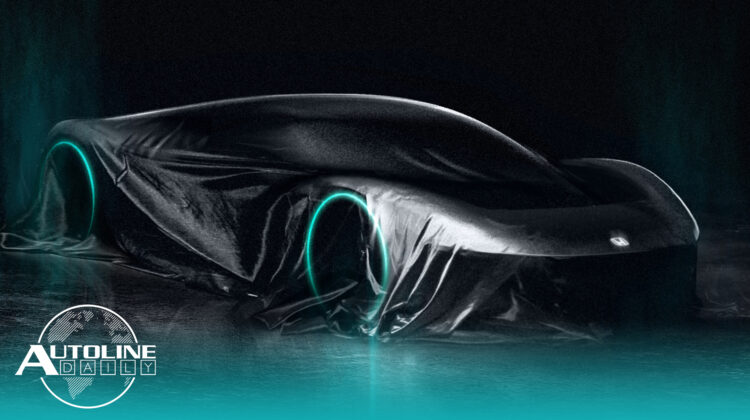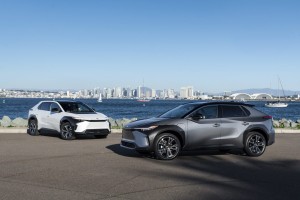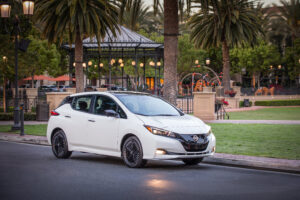
Listen to “AD #3301 – Honda Plans EV Onslaught; High Gas Prices Drive Consumers to EVs; GM and Ford Secure Battery Materials” on Spreaker.
Follow us on social media:
Runtime: 9:30
0:07 High Gas Prices Drive Consumers to EVs
1:04 U.S. Gas Prices Starting to Ease
1:36 U.S. to Extend E15 Fuel
2:08 Lawsuit Against EPA Backfires
3:29 Honda Plans EV Onslaught
5:17 GM Signs Deal for Cobalt
5:35 Ford Signs Lithium Deal
6:16 Toyota Readies bZ4X Launch
7:40 Nissan Gives Leaf a Slight Refresh
Visit our sponsors to thank them for their support of Autoline Daily: Bridgestone, Intrepid Control Systems and Schaeffler.
This is Autoline Daily, the show dedicated to enthusiasts of the global automotive industry.
HIGH GAS PRICES DRIVE CONSUMERS TO EVs
We sort of thought this was happening but now we’ve got the proof. Soaring gasoline prices are getting more people interested in electric vehicles. TrueCar is measuring significantly more activity on its car-shopping website. Shoppers looking at EVs shot up 380% in March compared to a year ago. Interest in hybrids was up 180%. TrueCar did a survey in the U.S. and found that 57% of respondents are more likely to buy an EV because of higher gas prices. One out of five said they are “extremely likely” to buy an EV. That’s a 50% jump from July of 2021. Men are more likely to buy an EV than women, 59% vs. 45%, but the gap is narrowing. And people in their twenties are the most likely to consider buying an EV.
U.S. GAS PRICES STARTING TO EASE
Even so, gas prices are starting to come down. Prices shot up to more than $4.30 a gallon after Russia’s invasion of Ukraine. And while they’re still high, they’ve now dropped to $4.11 a gallon on average in the U.S. That’s 22 cents lower than at the beginning of March, according to AAA. At least one analyst says prices could drop to $3.50 to $4 a gallon by Memorial Day.
U.S. TO EXTEND E15 FUEL
And to help ease gas prices even further, the Biden Administration will extend the availability of E15, gasoline with 15% ethanol, until September 15th. That should help stretch out supplies of gasoline. Ethanol has less energy than gasoline, but it also has a much higher octane rating and burns cleaner. The EPA is considering making E15 fuel available year round, which could help lower gasoline prices.
LAWSUIT AGAINST EPA BACKFIRES
Well, this took some guts. A couple of Chinese companies sued the Environmental Protection Agency when it blocked them from selling motorcycles and recreational vehicles because they used substandard catalytic converters. Taotao and the Jinyun County Xiangyuan Industry Company sold nearly 110,000 motorcycles and RVs in the U.S. with catalytic converters that didn’t meet certification requirements. They sued the EPA to prevent it from enforcing laws that protect the public’s health, but a judge just ruled in favor of the EPA, and the EPA fined both companies more than $1.6 million.
HONDA PLANS EV ONSLAUGHT
Honda is making up for lost time when it comes to EVs. Now it’s putting its money where its mouth is. It’s going to spend $64 billion or nearly 59 billion euros on R&D over the next 10 years. The majority of that will go towards electrification and software development. By 2030 Honda plans to launch 30 EV models globally, which would represent production of 2 million units a year. As we’ve reported and you likely know, some of those EVs will come from its partnership with GM. Two electric SUVs, one for Honda and one for Acura, launch in 2024, which is followed by more affordable EVs in 2027. To power those EVs, Honda is buying Ultium batteries from GM, but is also developing solid-state batteries that will hit the market after 2025 and is considering a joint venture for battery production. But surprisingly, Honda makes absolutely no mention of Sony, which it announced an EV alliance with in March. It does talk about a Honda e: Architecture that combines both hardware and software and we think it’s possible this is what’s being co-developed with Sony. But Honda won’t start adopting the platform until 2026 and the vehicles from the Honda and Sony joint venture were supposed to go on sale in 2025. So, this is something we’ll have to keep an eye on. But moving ahead, Honda also plans to introduce EVs for commercial use as well as mini-EVs and even a couple of sports cars. And one sure looks like a future-gen NSX to us.
GM SIGNS DEAL FOR COBALT
General Motors is lining up its own source of raw materials for EV batteries. It announced a multi-year deal with the Swiss-based company, Glencore, to get all the cobalt it needs. The cobalt, which comes from Australia, will be used in the cathodes of GM’s Ultium batteries.
FORD SIGNS LITHIUM DEAL
Along the same lines, Ford signed up with Lake Resources to get the lithium it needs from a facility in Argentina. The mining site is under development now, will cost $540 million to build and won’t be open until 2024. But once it’s up and running, Ford plans to get up to 25,000 tons of lithium a year.
TOYOTA READIES bZ4X FOR LAUNCH
Toyota released more details on its bZ4X electric crossover. And here are the basics. There are two trim levels, XLE and Limited. The base price is just over $42,000, not including destination charges, and range is 252 miles. That’s for the front-drive version. The all-wheel-drive version starts at $45,300 and has 228 miles of range. Both of them have 201 horsepower, with the front-drive version going 0 to 60 mph in 7.1 seconds, while the all wheel drive one does it in 6.5 seconds. You get three years of free connectivity services including voice-activated audio and HVAC controls as well as navigation. And you get a 1-year trial for things like roadside assistance, automatic collision notification and stolen vehicle locator. The bZ4X also comes with Toyota’s suite of safety systems, which are enhanced with a better radar and camera. To give you an idea of its size, it’s slightly longer and lower than a RAV4, and it’s about to go on sale very soon in the U.S. market. Click on the link in today’s transcript or in the description box if you’d like to get more details.
NISSAN GIVES LEAF A SLIGHT REFRESH
The Nissan Leaf is getting a slight refresh for the 2023 model year. Most notably it features an updated front end that isn’t as angular as before, which softens the design. The logo on the front is also now illuminated. The shape of the tire deflectors, rear under diffuser and rear spoiler were all modified to improve aerodynamics. The base Leaf S is equipped with a 40-kWh battery while the Leaf SV Plus comes with a 60-kWh one. Nissan didn’t reveal their EPA range but says it will be close to the outgoing model, 149 miles for the S and 215 miles for the SV Plus. Pricing will also be similar to the prior version, $28,425 for the S and $36,425 for the SV Plus. Both prices include destination charges. The refreshed Leaf goes on sale this summer.
We’ve got something of a coup this Thursday on Autoline After Hours. Our guest is GM President Mark Reuss and the topic is all about GM’s EV strategy. So join John and Gary for some of the best insights into the inner workings of the automotive industry from the very people who are making it happen.
But that’s a wrap for today. Thanks for tuning in.
Thanks to our partner for embedding Autoline Daily on its website: WardsAuto.com
Seamus and Sean McElroy cover the latest news in the automotive industry for Autoline Daily.









